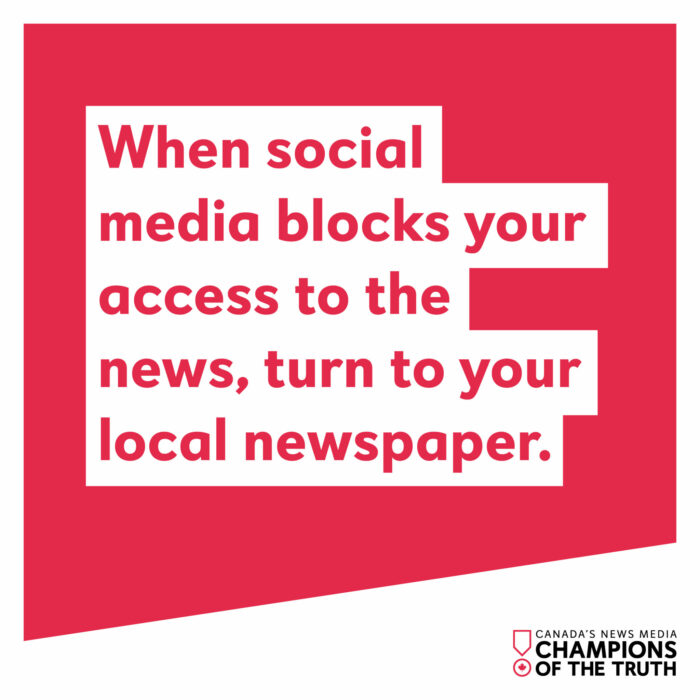
By Gord Cameron
President
Ontario Community Newspapers Association
Well, we knew it was going to happen, and it finally has. Meta, the parent company of Facebook and Instagram, has started blocking Canadian news from its social media platforms.
Why did one of the world’s richest companies decide to take this drastic step? In short, it doesn’t like the fact that after making money from the hard work of Canadian journalists for almost 17 years that they’re now required to fairly compensate the content creators. It basically wants to have its cake and eat it too – Facebook wants to make money from news, but is unwilling to provide the financial resources to ensure that reliable, trustworthy news can be created.
But wait a minute, don’t newspapers choose to post their content on Facebook and Instagram? Why should they be able to make use of the social media tools for free and then expect payment for items that they themselves chose to share? Isn’t this just a case of newspapers not adapting to the times?
Hogwash.
What newspapers are doing on social media is the same thing that’s been done for decades with print editions. Many titles have long histories of distributing copies, often free of charge, to local coffee shops, libraries and seniors’ residences in order to improve access to their content and to keep locals informed of the important community news of the week.
Now, imagine that those coffee shops, libraries and seniors’ residences turned around and sold or rented those copies to patrons and residents and kept all the money for themselves. That doesn’t seem right, does it? Well, that’s exactly what Facebook, Instagram and Google are doing when they sell ads based on the traffic that quality community journalism brings to their sites.
So, rather than helping to promote democracy and civic inclusion, as well as preventing the growth of unchecked misinformation on their platforms, the online giants have decided to place their bottom lines ahead of what’s best for their users. However, despite protests to the contrary, I think they’re going to discover just how important the presence of local news content on their sites is to them.
Several large advertisers have already pledged to stop advertising on the platforms, and, if I were a betting man, I’d wager that the amount of time that Canadians spend actively engaging Facebook (one of the company’s key success metrics) will also go down as readers look elsewhere for the news and information they crave.
Fortunately, since Facebook, Instagram and Google don’t create news, the news they’re hiding from you is still being produced by the same local journalists you’ve come to know and trust.
You can start by visiting chathamvoice.com. This contains all the same stories that you would have previously seen on social media or Google, only without the middleman. And just like Facebook, if you check back often you’ll find new content waiting for you to read.
There is content on chathamvoice.com that does not appear in the print version.
For those who still wish to receive their news via social media, the paper’s Twitter account @chathamvoice is still active and will continue to send out links to the online versions.
And of course, you can always get you news from the print edition, which is delivered to you each week. If you live in an area where The Voice is not delivered to your door, reach out to the paper to see where you can pick up a copy.
Those of us who have chosen to make a career in journalism and newspapers understand the duty we have to keep our communities informed, to ensure that those with power don’t abuse it and to help promote a sense of belonging and pride in the places we call home. However, we can’t do it for free and we shouldn’t have to sit by while others earn money from our passion and efforts while contributing nothing to the cost of its creation.
It’s like believing that as long as we’re paying the grocery stores, the farmers can get nothing.
In that world, we’d all starve. In the world that Facebook, Instagram and Google seem to want to create, we’d all be starved for credible, reliable local news.
- Gordon Cameron is president and interim executive director of the Ontario Community Newspapers Association. [email protected]





